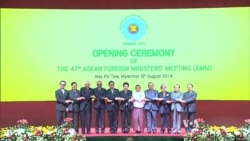Myanmar is to host leaders of the Association of Southeast Asian Nations (ASEAN) and the East Asia Summit next week. The gathering includes the U.S. and Russian presidents, China’s paramount leader and the Indian prime minister, as well as Southeast Asian leaders. Expectations are limited for the gathering.
The ASEAN way of consensus, conciliation and non-intervention has helped keep the peace in recent years in a historically volatile region.
And that is the only effective way for ASEAN to function, contends Rodolfo Severino, a former secretary general who heads the ASEAN Studies Center at the Institute of Southeast Asian Studies in Singapore.
“No, ASEAN is not about breakthroughs. ASEAN works on an incremental basis,” he told VOA during an interview via Skype.
But that can be an obstacle to tackling critical issues, according to Professor Jason Briggs at the Bangkok campus of Webster University.
“ASEAN, typically at summits and when the members are meeting, the outcomes are memorandums, declarations and joint statement - soft law type mechanisms instead of more hard law type binding instruments," he said.
Cross-border trade, travel
One of its most significant accomplishments is expected to be next year’s inauguration of the ASEAN Economic Community, facilitating cross-border trade and travel. But details remain vague, something that should be clarified at this year’s summit says Severino, the former ASEAN Secretary-General from the Philippines.
“... meaning what kind of community are we looking at and here the leaders have to define it because it’s not so far away. And it will happen during Malaysia’s chairmanship. It will have to happen,” he said.
At last year’s summits, President Barack Obama cancelled his trip amid the U.S. government shutdown, allowing China’s leaders to grab the spotlight.
Critical for U.S. diplomacy this year will also be the face time, one-on-one, with government heads from outside ASEAN’s ten member states.
“The leaders from India with the new Modi administration and Russia - of course we have many bilateral concerns with Russia in the U.S. - they are also invited. It’s also an opportunity for there to be potentially some constructive dialogue on the side between President Obama and those leaders,” he said.
Obama’s sideline discussions will cover a number of critical issues, including the Islamic State extremist movement, the continued trouble in Ukraine, difficulties with the trans-Pacific trade talks, China’s maritime expansion and how to contain west Africa’s Ebola epidemic.






